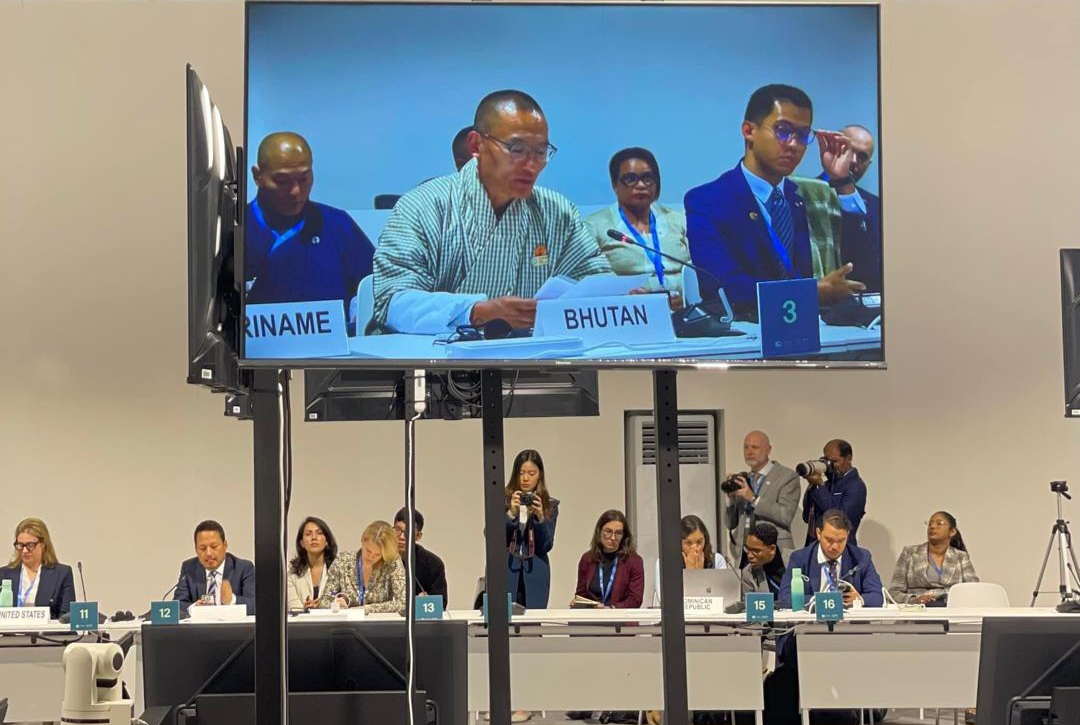By Rinzin Wangchuk, Executive member of SJF
Baku. In a world grappling with the harsh realities of climate change, four countries found themselves at a crucial crossroads. They were Bhutan, Madagascar, Panama, and Suriname— countries that, despite contributing little to global carbon emissions, were bearing the brunt of an ecological crisis.
Each one, in its own unique way, had cultivated a deep connection with nature, fostering policies that preserved their vibrant ecosystems while facing economic challenges. It was a shared understanding of their plight that led them to unite in a groundbreaking initiative—G-ZERO.
This initiative was unveiled at the 29th Conference of the Parties (COP29) of the United Nations Framework Convention on Climate Change (UNFCCC) in Baku, Azerbaijan, on November 12. It aims to inspire leadership and accelerate global momentum toward a net-zero, climate-resilient, and nature-positive future.
Unveiling this landmark initiative, the leaders of the four G-ZERO nations emphasized that this is not just another forum, but a pivotal movement to drive progress in redefining our broken relationship with the planet. Bhutan’s Prime Minister Tshering Tobgay stated, “Our launch today is not a mere declaration—it is a commitment to lead by example and advocate for a global response to the climate crisis. We are firmly committed to spearheading the global movement toward carbon neutrality and nature-positive solutions.” PM Tobgay added that G-ZERO serves as a bridge to stronger international partnerships in the race to decarbonize the global economy.
“It is a small but bold and meaningful endeavor by the founding countries,” the Bhutanese Prime Minister stated. The G-ZERO forum recognizes and commits to scaling ambition in the next round of climate action plans (known as Nationally Determined Contributions or NDCs) due for submission in 2025, and pledges to remain carbon neutral at all times. With this greater ambition, G-ZERO calls upon the world to deliver an ambitious means of implementation support to reduce emissions by 2035 in line with the 1.5°C pathway and mitigate the triple planetary crisis.

In addition to the Paris Agreement, the initiative aligns with the Pact for the Future adopted by world leaders at the recent Summit of the Future, the Kunming-Montreal Global Biodiversity Framework’s goal of living in harmony with nature by 2050, and the call for countries to enhance ambitions in their NDC 3.0.
Roles of Member Countries:
In a joint declaration issued yesterday after the forum, the leaders of the four G-ZERO nations expressed a strong, unified commitment to advancing global climate action, leveraging their unique voices, perspectives, and capabilities to foster a new era of global cooperation and innovation.
“As carbon-negative and carbon-neutral countries, we take on a unique responsibility—and view this as an opportunity—to maintain our momentum as part of the group committed to protecting and enhancing carbon sinks, while promoting nature-positive pathways. We aim toward a future that safeguards biodiversity, supports sustainable development, and ensures resilience against the impacts of climate change,” the leadership of the G-ZERO member countries stated in the declaration.
Rich in natural ecosystems, the member countries have committed to policies that limit greenhouse gas emissions and conserve and enhance vital carbon sinks such as forests, wetlands, and other ecosystems.
The G-ZERO forum will advocate for enhanced climate ambition, increased financial support in all its forms, technology transfer, and inclusive climate policies that empower developing nations and protect vulnerable communities. The member countries will collaborate to share experiences, exchange policy solutions, and develop technical expertise on net-zero pathways for a sustainable world.
Additionally, the G-ZERO forum aims to amplify the voices of carbon-negative and carbon-neutral nations in international climate policy dialogues. It will work toward maximizing diverse, innovative financing to conserve and enhance carbon sinks as well as protect biodiversity and other ecosystems.
Given Bhutan’s exemplary environmental stewardship and climate leadership, Bhutan is uniquely positioned to lead the G-ZERO initiative. “As a nation that has always put nature and environmental conservation at the heart of its development, Bhutan has invaluable knowledge and experiences to share with the world in terms of living in harmony with nature,” a Bhutanese delegate said.
At the same time, Bhutan is increasingly experiencing various adverse impact of climate change. Through the -G-ZERO initiative, Bhutan will draw attention to the impact of climate change on Bhutan and other climate vulnerable nations and communities. “The -G-ZERO initiative also presents opportunities to call for increased financial and technical support from the international community to enable vulnerable countries and communities to mitigate and adapt to the impact of changing climate,” one participant from Bhutan said.
G-ZERO will operate with a rotating presidency among member countries supported by a permanent Secretariat in Bhutan. The Secretariat will coordinate development of a detailed work programme or plan of action over the next one year, which will be announced at COP30 in Brazil.






